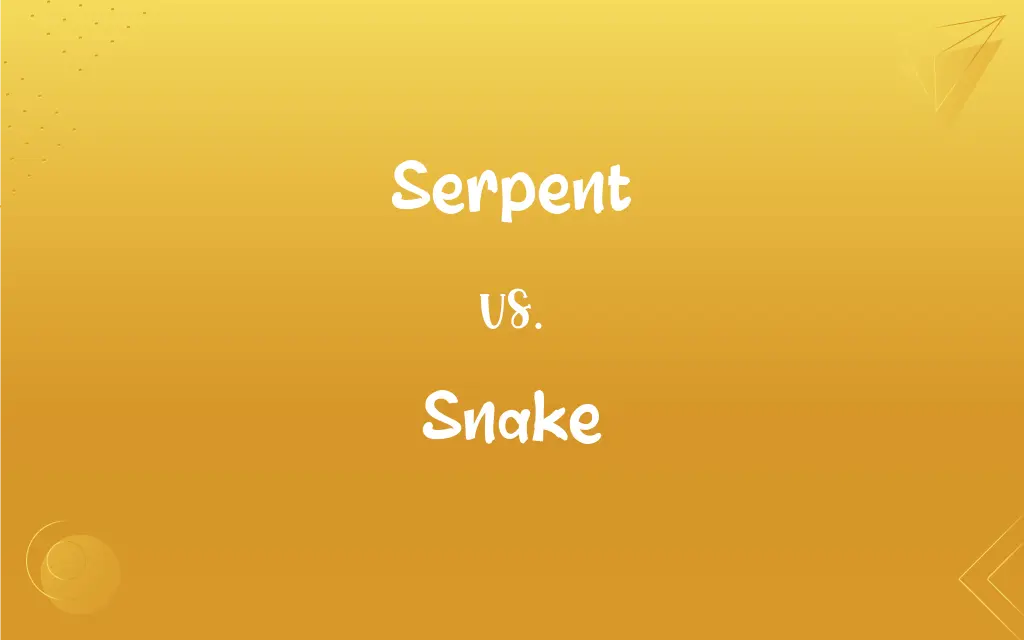Serpent vs. Snake: What's the Difference?
Edited by Aimie Carlson || By Janet White || Published on January 8, 2024
"Serpent" often conveys symbolic or mythological contexts, while "snake" is a more general, biological term for legless, elongated reptiles.

Key Differences
Serpent is a term that carries mythological, symbolic, and literary connotations, often used in historical, religious, or cultural texts. Snake, in contrast, is a common term in biology and everyday language, referring specifically to the reptiles in the suborder Serpentes.
In literature and art, serpent is frequently used to symbolize evil, wisdom, or fertility, drawing from various cultural and religious mythologies. The word snake, however, typically lacks these symbolic connotations and is used more for describing the animal in a literal sense.
The term serpent often evokes a sense of mystery, danger, or power, influenced by its historical and mythological usage. Snake is a more neutral term, used to describe the animal in scientific, educational, or casual contexts without the added mythical or symbolic layers.
Serpent is used less frequently in everyday conversation and is more likely to appear in formal, literary, or academic discussions. Snake is a more commonly used term, familiar and straightforward, referring to the reptile in various contexts, from zoology to common speech.
In terms of linguistic usage, serpent has an older, more archaic feel, often associated with ancient texts or classical literature. Snake, on the other hand, is a more modern term, universally recognized and used across various languages and cultures in both spoken and written forms.
ADVERTISEMENT
Comparison Chart
Connotation
Symbolic, mythological
Biological, literal
Usage in Literature
Often symbolizes evil, wisdom, fertility
Used to describe the animal itself
Emotional Association
Mystery, danger, power
Neutral, without added symbolic meaning
Frequency of Use
Less common, more formal
Common, used in everyday language
Linguistic Context
Archaic, historical
Modern, straightforward
ADVERTISEMENT
Serpent and Snake Definitions
Serpent
A creature associated with evil or cunning in many myths.
Legends often depict the serpent as a deceptive character.
Snake
A legless, elongated reptile.
She saw a snake in the garden.
Serpent
A symbolic or mythological snake.
The serpent in the garden was a common motif in ancient art.
Snake
A term used in zoology to refer to reptiles in the suborder Serpentes.
The biologist studied the behavior of the snake.
Serpent
A term used in historical or religious texts.
The ancient scriptures spoke of a great serpent.
Snake
Used informally to describe a deceitful person.
He was called a snake for his betrayal.
Serpent
Used poetically to describe a snake.
The serpent slithered through the grass silently.
Snake
A common subject in herpetology.
Snakes are a fascinating topic for herpetologists.
Serpent
Representing wisdom or fertility in various cultures.
The serpent is a symbol of healing in some mythologies.
Snake
A creature known for shedding its skin.
The snake sheds its skin to grow.
Serpent
(Zoology) A snake.
Snake
See Shoshone.
Snake
See Hydra.
FAQs
Can "serpent" refer to mythical creatures?
Yes, it often appears in myths and legends.
Is "snake" a scientific term?
Yes, it's commonly used in biology and zoology.
Does "serpent" imply a larger size than "snake"?
Not necessarily, though it can evoke a sense of grandeur or power.
Are all serpents snakes?
In a broad sense, yes, but "serpent" often has additional symbolic meanings.
Does "snake" have cultural significance?
It can, but it's more often used in a literal, biological sense.
Is "serpent" used in modern language?
It's less common and often used in literary or formal contexts.
Are snakes common in folklore?
Yes, they appear in many cultural folklores and stories.
Can "serpent" be used in a positive context?
Yes, in some cultures, it symbolizes wisdom or healing.
Does "serpent" have an archaic connotation?
Yes, it's often associated with older, classical texts.
Are snakes always portrayed negatively?
Not always, although "snake" can be used as a metaphor for deceit.
Is "serpent" used in artistic depictions?
Yes, especially in historical or symbolic art.
Does "snake" have different meanings in various cultures?
Yes, its symbolism and interpretation can vary.
Can "serpent" be used casually?
It's less common and usually reserved for formal or literary use.
Do "serpent" and "snake" have different origins?
Yes, "serpent" has a more historical and mythological origin.
Is "serpent" a term in religious texts?
Yes, it frequently appears in various religious and historical texts.
Can "snake" be used metaphorically?
Yes, often to describe a deceitful person.
Can "snake" refer to any elongated, legless creature?
Generally, it refers specifically to reptiles in the suborder Serpentes.
Can "snake" be used positively?
Yes, especially in contexts that appreciate wildlife or nature.
Is "snake" a broad term for all reptiles?
No, it specifically refers to members of the suborder Serpentes.
Is "snake" used in children's literature?
Yes, often in a more literal or friendly depiction.
About Author
Written by
Janet WhiteJanet White has been an esteemed writer and blogger for Difference Wiki. Holding a Master's degree in Science and Medical Journalism from the prestigious Boston University, she has consistently demonstrated her expertise and passion for her field. When she's not immersed in her work, Janet relishes her time exercising, delving into a good book, and cherishing moments with friends and family.
Edited by
Aimie CarlsonAimie Carlson, holding a master's degree in English literature, is a fervent English language enthusiast. She lends her writing talents to Difference Wiki, a prominent website that specializes in comparisons, offering readers insightful analyses that both captivate and inform.








































































